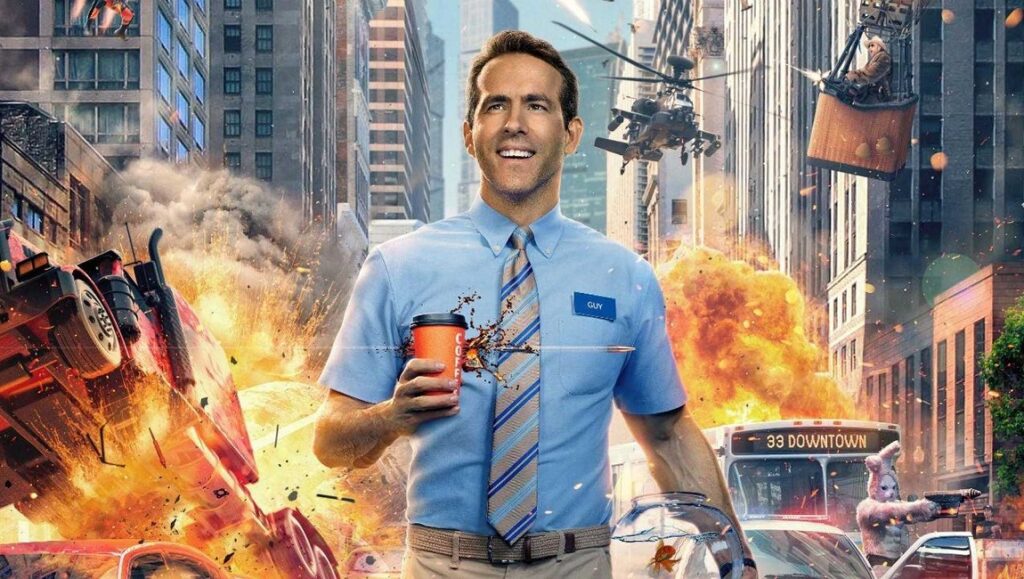Free Guy is the rare tentpole based on an original idea rather than existing IP, and supplements that present-day novelty with a game cast and genuine emotion.
Shawn Levy has mostly built a career out of innocuous action comedies that, while not exactly critical darlings, have raked in big box office returns: the Night at the Museum trilogy, Cheaper by the Dozen, The Pink Panther, the list goes on. His latest film, Free Guy, is one of the few that doesn’t feel like empty calories, and while it retains his typically laid-back aesthetic and down-the-middle sense of humor, he seems to have found the perfect leading man for his particular style in the form of Ryan Reynolds, who not only anchors the film with his nonchalant charm — assuming you’re not of the considerable demographic who finds his shtick grating; but then, why are you here? — but also adds an unexpected layer of heart that elevates the film above the director’s standard fare.
While it says something about how low the bar for mainstream cinema is that any big budget tentpole that isn’t based on a previously existing intellectual property is cause for celebration, but by that depressing yardstick, Free Guy is something of a rarity. And save for a couple of groan-worthy pieces of Disney synergy that pop up near its climax, the film mostly stands on its own two feet within the unique world it constructs. Reynolds stars as Guy, a non-playable background character in a popular video game called Free City, which is basically a Grand Theft Auto-type spectacle in which players get points for knocking off civilians. But Guy is different, often finding himself longing for something outside of his daily routines, and he discovers that something in the form of a player named Millie (Jodie Comer), whose avatar he quickly falls in love with, not knowing that she is real and he isn’t. Millie, it turns out, is an independent game designer who, along with her partner, Keys (Joe Keery), is trying to prove that Free City‘s creator, Antoine (Taika Waititi), stole their code and used it to make millions. But their code was designed for its denizens to learn and grow, and Guy is doing just that, becoming a fully-aware, sentient consciousness whose perception of the world is about to be shattered.
Free Guy plays a bit like The Truman Show, but set in a video game and with the implied context of AI. And while Levy’s film certainly doesn’t approach the existential elegance of Weir’s, it does tackle the idea of the powerless reclaiming their power and embracing the full possibility of their existence outside of what has been imposed upon them by the string-pulling powers in a way that studio tentpoles like this rarely do. Reynolds, Comer, and Keery are a terrific lead trio, and Waititi and Lil Rel Howery are suitably strong in their supporting roles, delivering characters worth investing in. It’s a crowd-pleaser in the very best sense of the term, a disarmingly endearing underdog story that earns its emotional beats thanks to a game cast and a director who knows how to play to their individual strengths. In any other year, it could have easily gotten lost in the summer shuffle, but with a COVID-era dearth of cinematic offerings, and especially those not based on IP, Free Guy feels like a welcome oasis in the desert.


Comments are closed.